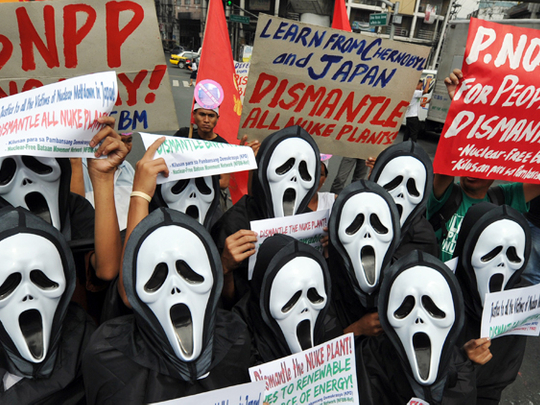
The Philippines: The Philippines and Russia have signed an agreement that is seen to revive Manila’s long mothballed plans to generate power from nuclear energy.
According to Energy Secretary Alfonso Cusi, the Philippines’ Department of Energy had recently signed a memorandum of cooperation with the Russian Federation State Atomic Energy Corporation (Rosatom) for peaceful applications of nuclear energy.
“The cooperation with Russia is part of the government’s intention to develop a variety of applications of nuclear energy that are within our policies, particularly for power generation,” Cusi said.
Russia and the Philippines signed the Memorandum of Cooperation (MOC) on November 13 on the sidelines of the 12th East Asia Summit in Manila.
“Through this MOC, we can tap the significant experience of Russia in harnessing nuclear energy and the emerging technologies related to it for peaceful purposes that is safe and secure,” Cusi said.
It can be recalled that the Philippines had a nuclear energy programme during the early 1980s; however, political developments in the country led to the cancellation of the nuclear energy plan altogether.
A multi-billion nuclear plant was already under construction in Bataan northwest of Manila during the administration of Ferdinand Marcos Sr when opposition from groups questioning its safety and the ouster of the President led to the cancellation of the programme and the mothballing of the plant.
The Bataan Nuclear Power Plant (BNPP), which could have answered Metro Manila and the surrounding areas need for energy for decades, never had a chance to get on stream and provide power.
In the years following Marcos’ ouster in 1986, Metro Manila and nearby provinces had to contend with daily power outages lasting for several hours. The economic productivity of the region was affected as well as the country.
According to Cusi, undertakings in the MOC would support the Philippines in coming up with a national position and the crafting of a nuclear energy policy that may lead to a nuclear energy programme.
The agreement has three main objectives, one is to craft nuclear infrastructure studies towards national energy policy development and nuclear energy programme implementation in the Philippines.
Two, is to audit and assessment of the BNPP’s technical condition, including the option of its rehabilitation.
And three, feasibility studies on construction in the Philippines of small modular nuclear power plants, onshore or offshore, but not limited to analysis of technical, commercial, financial and legal aspects.
The MOC will run for five years and is renewable for the same period.
Both the Philippines and the Russian Federation are members of the International Atomic Energy Agency (IAEA) and are parties to the Treaty on the Non-Proliferation of Nuclear Weapons of July 1, 1968.












